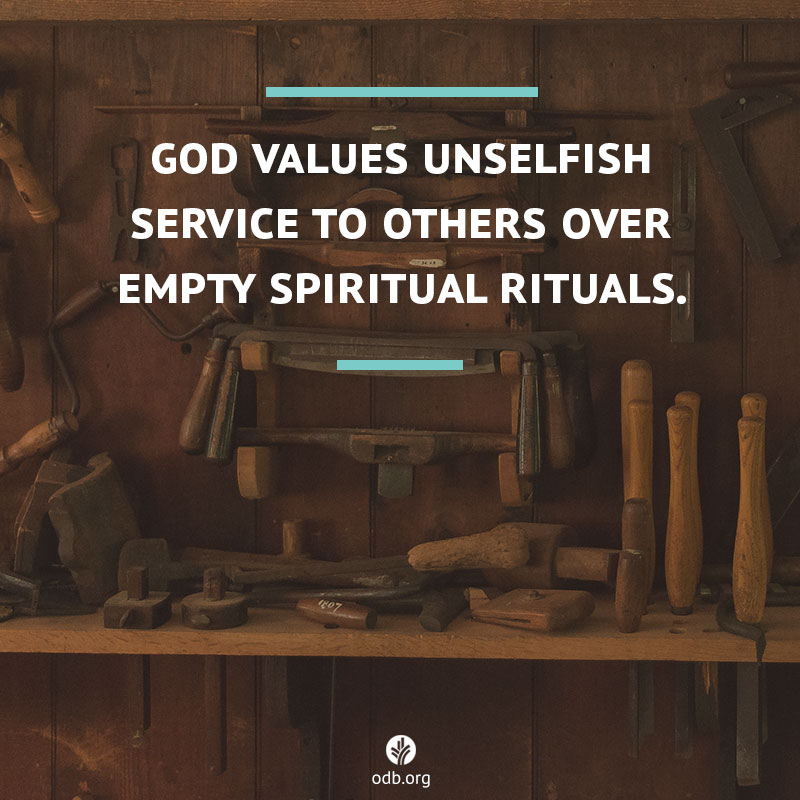Lavish Expressions of Love
On our wedding anniversary, my husband, Alan, gives me fresh flowers. When he lost his job during a corporate restructure, I didn’t expect this extravagant display of devotion to continue. But on our nineteenth anniversary, the color-splashed blossoms greeted me from their spot on our dining room table. Because he valued continuing this annual tradition, Alan saved some money each month to ensure he’d have enough for this personal show of affection.
My husband’s careful planning exhibited exuberant generosity, similar to what Paul encouraged when he addressed the Corinthian believers. The apostle complimented the church for their intentional and enthusiastic offerings (2 Corinthians 9:2, 5), reminding them that God delights in generous and cheerful givers (vv. 6–7). After all, no one gives more than our loving Provider, who’s always ready to supply all we need (vv. 8–10).
We can be generous in all kinds of giving, caring for one another because the Lord meets all of our material, emotional, and spiritual needs (v. 11). As we give, we can express our gratitude for all God’s given us. We can even motivate others to praise the Lord and give from all God’s given them (vv. 12–13). Openhanded giving, a lavish expression of love and gratitude, can demonstrate our confidence in God’s provision for all His people.
Bible Conference 2018
We cordially invite you and your loved ones to join us to feast on God’s Word together at our Bible Conference. Click for more information.

Unselfish Service
A small collection of people stood together, dwarfed by the size of the huge tree lying on the lawn. An elderly woman leaned on her cane and described watching the previous night’s windstorm as it blew down “our majestic old elm tree. Worst of all,” she continued, voice cracking with emotion, “it destroyed our lovely stone wall too. My husband built that wall when we were first married. He loved that wall. I loved that wall! Now it’s gone; just like him.”
Next morning, as she peeked out at the tree company workers cleaning up the downed tree; a big smile spread across her face. In between the branches she could just make out two adults and the boy who mowed her lawn carefully measuring and rebuilding her beloved stone wall!
The prophet Isaiah describes the kind of service God favors: acts that lift the hearts of those around us, like the wall repairers did for the elderly woman. This passage teaches that God values unselfish service to others over empty spiritual rituals. In fact, God exercises a two-way blessing on the selfless service of His children. First, God uses our willing acts of service to aid the oppressed and needy (Isaiah 58:7–10). Then God honors those engaged in such service by building or rebuilding our reputations as powerful positive forces in His kingdom (vv. 11-12). What service will you offer this day?

Perfect Imperfection
A college professor of mine, picking up on my perfectionism-induced procrastination, gave me some wise advice. “Don’t let perfect be the enemy of good,” he said, explaining that striving for perfect performance can prevent the risks necessary for growth. Accepting that my work would always be imperfect would give me the freedom to never stop growing.
The apostle Paul explained an even more profound reason to let go of our own efforts to perfect ourselves: it can blind us to our need for Christ.
Paul had learned this the hard way. After years striving to perfectly obey God’s law, encountering Jesus changed everything (Galatians 1:11–16). Paul realized that if his own efforts were enough to be whole and right with God, “then there was no need for Christ to die” (2:21
This doesn’t mean we shouldn’t resist sin (v. 17); but it does mean we should stop relying on our own strength to grow spiritually (v. 20).
In this lifetime, we will always be works in progress. But as our hearts humbly accept our constant need for the only perfect One, Jesus makes His home there (Ephesians 3:17

Jesus Knows Why
I have friends who’ve received partial healing but still struggle with painful aspects of their disease. Other friends have been healed of an addiction but still struggle with feelings of inadequacy and self-loathing. And I wonder, Why doesn’t God heal them completely—once and for all?
In Mark 8:22–26, we read the story of Jesus healing a man born blind. Jesus first took the man away from the village. Then He spit on the man’s eyes and “put his hands on him.” The man said he now saw people who looked “like trees walking around.” Then Jesus touched the man’s eyes again, and this time he saw “everything clearly.”
In His ministry, Jesus’s words and actions often amazed and baffled the crowd and His followers (Matthew 7:28; Luke 8:10; 11:14) and even drove many of them away (John 6:60–66). No doubt this two-part miracle also caused confusion. Why not immediately heal this man?
We don’t know why. But Jesus knew what the man—and the disciples who viewed his healing—needed in that moment. And He knows what we need today to draw us closer in our relationship with Him. Though we won’t always understand, we can trust that God is working in our lives and the lives of our loved ones. And He will give us the strength, courage, and clarity we need to persevere in following Him.
